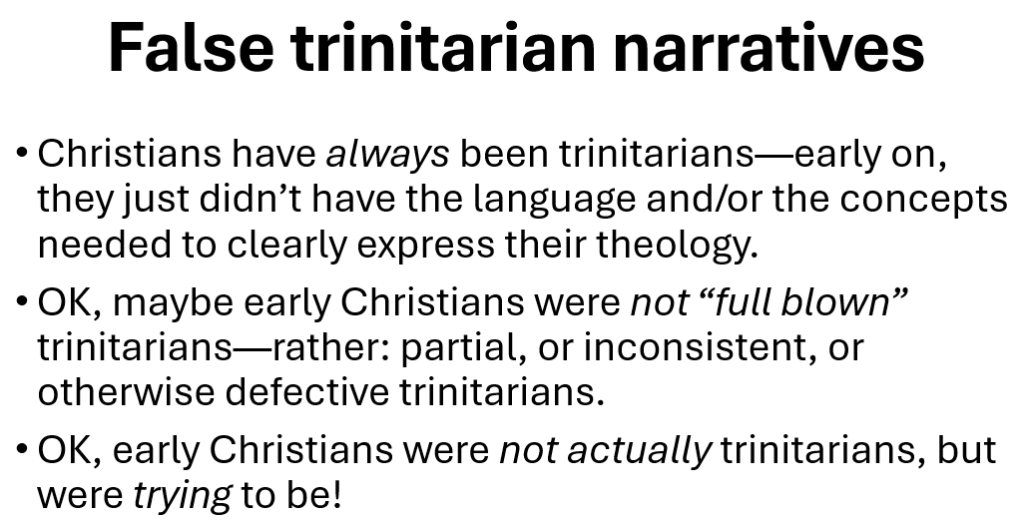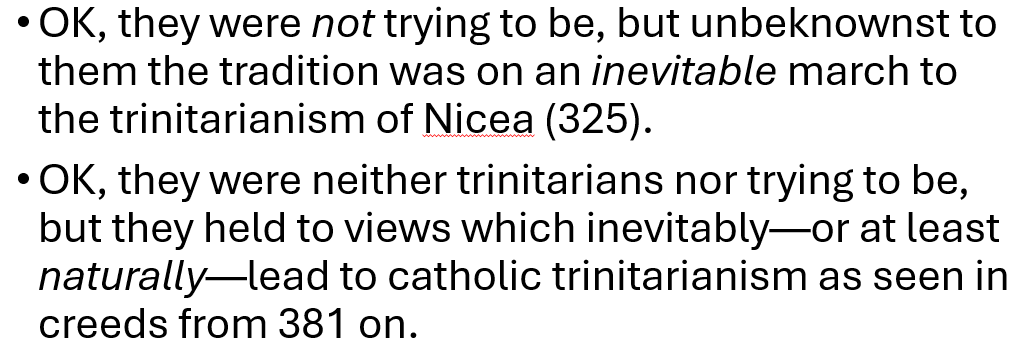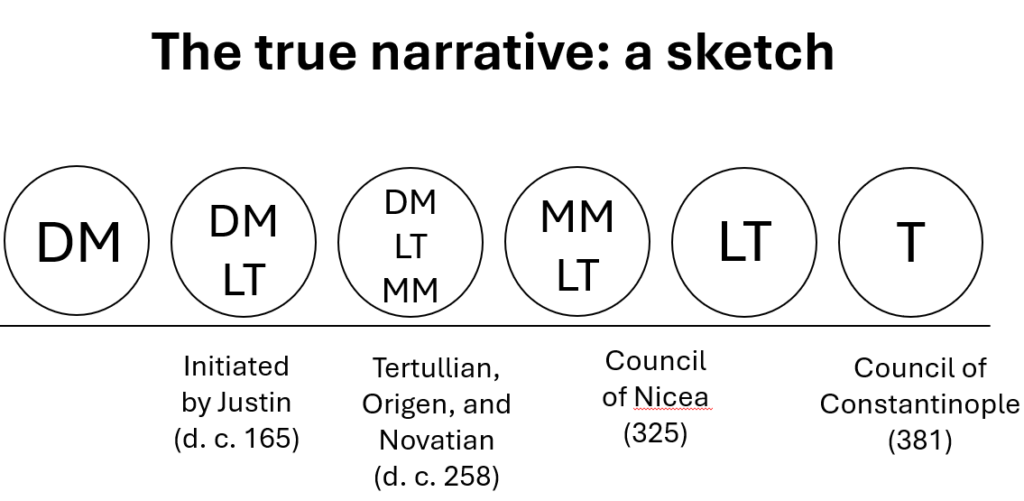Podcast: Play in new window | Download
Subscribe: Spotify | Email | RSS
In videos like this one and this one, trinitarian apologists continue to push false narratives about the history of mainstream Christian theologies, like these (ordered from least to most plausible):


In this historical presentation, focusing on passages from Tertullian, Origen, and Novatian, I explain the actual early history of mainstream Christian theologies. Each of these three authors is a logos theorist, and I explain how they think God and the Logos (aka “the second god”) differ. “Subordinationism” is a feature, not a bug of these theologies; it is how they stay monotheistic despite positing multiple “divine” beings–only one “god” is strictly speaking a god. Each writer implies that logos theory was in their day a minority view; it seems that logos theories were at first popular among the “elite” and were widely rejected by other Christians. Each of these writers describes Christians who disagree with their Logos speculations. Since Harnack historians have called these Dynamic Monarchians and Modalistic Monarchians. Using the stick figures first deployed here, I explain the differences between these three mainstream Christian theologies, and between each of them and the trinitarian theology that was demanded by the mainstream starting in 381. Finally, I take a stab out outlining the actual early history of Christian theologies, starting with Dynamic Monarchianism and ending with the hegemony of trinitarianism.
Because of the many slides (and stick figures) I recommend the video version:
Thanks to Brandon Duke for editing the video and to Mark Cain for expertly cleaning up the lecture audio! Finally, my sincerest thanks to the tireless UK International Conference committee whose hard work made this encouraging meeting possible. Watch the UCA blog for an announcement of the next UK international conference!
Links for this episode:
Thomas Gaston, Dynamic Monarchianism: the Earliest Christology?
podcast 281 – Introducing the Unitarian Christian Alliance
Clarifying Catholic Christologies
podcast 270 – Origen’s “one God”
von Harnack on logos theories and mystery
Evolution of the Trinity – with Bill Schlegel
podcast 262 – The Trinity before Nicea?

Hurtado on the early worship of Jesus
Craig: how Nicene orthodoxy rules out the full deity of Christ
Origen on the Challenge to Jesus is God Apologists
trinitarian or unitarian? 7 – Origen uncensored
Origen, Paul, and Peter: Christians worship the Jews’ god
Rufinus’s corruption of Origen’s On First Principles – Part 1
Rufinus’s corruption of Origen’s On First Principles – Part 2
podcast 24 – How to be a Monotheistic Trinitarian
This week’s thinking music is “Blood (Instrumental)” by Anthem of Rain.

Well done. Thank you for your hard work and ongoing scholarship.
Here are some things I note that your conferences are lacking, or perhaps this conference specifically.
1. It seems you do not address the importance of, and the fact that, there is very certainly one true doctrine in the Scriptures and people definitely have the ability to know this doctrine. I notice this lacking from your organisation and believe it is a big weakness because while these debates are a good way to reach many people, me as the inquirer do not see an end result or strong doctrine to be able to apply to my own life..
2. While you expertly address the many opinions of who God and Jesus are, and you do well at refuting the doctrines of the Trinity from a factual basis, only when you speak of Jesus, I do not hear any clear distinction from that still of what the greco-roman philosophers believed. For instance, when you talk about the humanity of Jesus, I do not hear you tell people the reason of what makes him special. Which, the answer being, because he was divinely conceived as the “last Adam”, the promised redeemer. He was divinely conceived through Holy Spirit as a separate bloodline, different from the rest of mankind, and this is why he was so very rare and precious to both God and mankind, and now to everyone who accepts him as the propitiation for their life. Love in the Lord.
Sir,
I have a different view which I think is the Apostolic which explains why their language is interpreted different ways.
First, they were TRADUCION concerning the origin of souls, Levi paid tithes to Melchizedek while in Abraham.
Second they applied the same Traducion logic to Jesus because of the virgin birth. Jesus was in the Father from the beginning in creation just like Levi was in Abraham paying tithes to Melchizedek.
In the beginning the word was with God and the word was God.
In paying tithes to Melchizedek, Levi was with Abraham and Levi was Abraham.
In the Garden we were all with Adam and we all were Adam.
This was common to the Hebrews (that is why Paul can make the argument) but not the Greeks who probably held Plato’s view in common. The Greek view was a pre-existing soul or breath that was infused into a tripartite body of head, heart, and stomach (not going to attempt to spell the Greek names) and we do see Paul using these terms but not necessarily affirming what Plato said about them. He is not identifying them with Father, Son, and Spirit as a Trinity but rather he uses them from a Traducion understanding.
Tertullian was I think Traducion which is why he further developed logos theory but it’s not clear to me how well he understood this Hebrew perspective.
Traducionism is carried by the blood, “the life is in the blood” and a son is a son because he has his Father’s blood, therefore the virgin born Jesus has his Father’s blood. He is ethnically divine not less than but equal to the Father yet emptied himself of those abilities to take on and identify with those in his image. The image of Adam was the image of the incarnate Christ, that’s why we have the first is last, last is first, second Adam is the first Adam.
Because of the blood inheritance it’s presumed that everything the Father builds into the estate is for the Son. DIVINE CONSANGUINITY in DIVINE TRADUCION origin. The language of adoption follows naturally to the time the son can manage the estate without guardians.
The inheritance is passed at the death of the Testator, the Father (see Hebrews). When did the Father die? At the cross because the Father’s blood was shed in the son (the only begotten) and the estate ended (see Romans 7 the husband is YHVH and the wife is ISRAEL, as in Hosea, the husband died and she is free to marry another the one who rose from the dead).
Whether you have philosophical questions or not, I can’t see any other way they thought these arguments could make sense other than Divine Traducionism.
The Latin tradux is the word for vine, so Jesus literally taught Divine Traducionism, although I think he used the Hebrew SHORAK choice Vine, rather than GEPHEN the regular vine of Adam.
The problem with the Trinity is that you can’t say ONE GOD IN THREE PERSONS IN HEBREW because all Hebrew words for PERSON are derived from Adam, whether Ben Adam, Ish, Enush, Anashim, etc. Even Eve, HAVAH from Chaiyah, came from Adam to be the mother of all living, Traducionism again.
Is the Father Ben Adam? Is the Spirit Ben Adam? Only the son is the Ben Adam (Genesis 3 15) because of the virgin birth. Notice Hebrews considered one a person in the flesh from the mother but a person in the spirit from the Father. Adam and Eve were already one flesh because Eve came from the flesh of Adam, their becoming one flesh would be in the child, and in particular the prophecied child in whom we would have spiritual birth “unto us a child is born and a Son is GIVEN”-Isaiah.
So Jesus is the only person of God because the Trinity is in the blood.
Comments are closed.